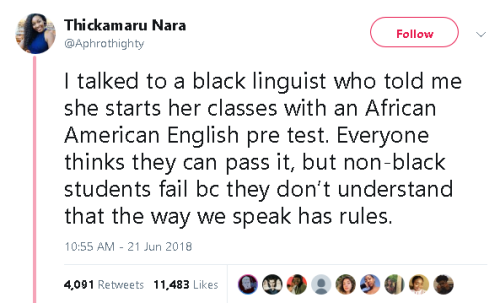prismatic-bell: im-just-a-penguin: prismatic-bell: gahdamnpunk: THIS Can confirm. My favorite book o
prismatic-bell: im-just-a-penguin: prismatic-bell: gahdamnpunk: THIS Can confirm. My favorite book on linguistics has an entire section on AAVE that talks about this. So some people are better at bad English than others? Also, in what kind of classes is this knowledge useful? It’s useful for the kind of classes where people aren’t busy being assholes about how other people speak, @im-just-a-penguin. But don’t take my word for it! Here’s a website dedicated to explaining dialects that goes over the rules. Here’s a professional linguist who specializes in AAVE, and just one of his many papers explaining that AAVE is a proper dialect. Hot shit! Here’s an article from STANFORD UNIVERSITY that’s literally titled “AAVE is not Standard English with mistakes”!!! Here’s a blurb from PBS, introducing the topic of whether AAVE is a creole or a dialect. You’ll notice neither one of those options means ‘just poor English’. Here’s English Language and Linguistics Online, which is a nice technical linguistics website, further deconstructing how AAVE works. Here’s a paper on the habitual “be” from New York University. Here’s a link to some information from Portland University. I wish to draw your attention specifically to the phrase: “linguists now agree that AAVE is not ‘broken’ English, or slang”. Here’s a super-technical paper on phonology in AAVE, which gets down into things like why AAVE speakers may say “axed” instead of “asked.” Hm. Looks like there are a lot of people who study this stuff for a living who disagree with your assessment that it’s “bad English.” I guess you better get reading … . asshole. -- source link
Tumblr Blog : gahdamnpunk.tumblr.com
#mod ollie


